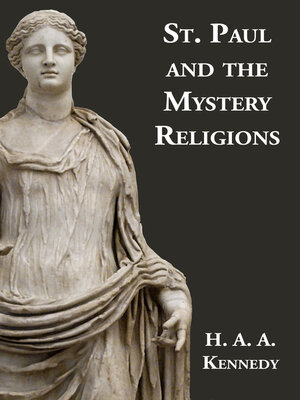
Sign up to save your library
With an OverDrive account, you can save your favorite libraries for at-a-glance information about availability. Find out more about OverDrive accounts.
Find this title in Libby, the library reading app by OverDrive.



Search for a digital library with this title
Title found at these libraries:
| Library Name | Distance |
|---|---|
| Loading... |
It is scarcelynecessary to apologise for a discussion of St. Paul's relation to theMystery-Religions of his Hellenistic environment. One of the most noteworthyfeatures in the trend of contemporary scholarship is the interest manifested byphilological experts in the phenomena of that extraordinary religioussyncretism which prevailed in the Græco-Roman world between 300 b.c. and 300 a.d. Their learned and instructive investigations touch nascentChristianity at numerous points, and raise many fascinating questions. Obscureplaces in early Christian literature are being illuminated, and the NewTestament itself has much to gain from the historical reconstruction of thehabits of thought and beliefs in the midst of which it came into being. Thenatural tendency, however, of explorers in remote fields is to over-estimatethe significance of their discoveries. This temptation, I believe, has not beenescaped by the pioneer workers in the province of Hellenistic religion. Andtheir readiness to look in that direction for the source of various importantChristian conceptions has been encouraged by the ardour of those theologianswho find in the comparison of religions the main clue to the interpretation ofChristianity.
As a matter offact, the chief defect in the process is the failure to be sufficientlyrigorous in the application of the historical method. The more immediatebackground of the Christian faith is apt to be strangely neglected. It willappear again and again in the course of the present investigation that the OldTestament supplies a perfectly adequate explanation of ideas and usages in theEpistles of Paul which it is the fashion to associate with Hellenisticinfluence. Perhaps Deissmann may be charged with over-statement when hedeclares that "if we are to understand the complete Paul from the view-point ofthe history of religion, we must grasp the spirit of the Septuagint" (Paulus, p. 70). But one has no doubtwhatever that this assertion sets in bold relief an aspect of the situationwhich is too frequently ignored.
To dismiss theview that the Christianity of Paul is a syncretistic religion is not, however,to close one's eyes to the light which may be shed from many quarters on theconditions in which he accomplished his work as a missionary. And if we are todo full justice to his own famous statement, "I have become all things to allmen that at all events I might save some," we must recognise his willingness toput himself en rapport with themen and women whom he sought to win for Christ. Hence it is of real value tounderstand something of the religious atmosphere in which his converts hadlived as Pagans, if we are to grasp the more delicate implications both of histhought and language in those Letters which answered their questions and dealtwith their spiritual dangers.
H. A. A. Kennedy.
New College, Edinburgh,
July 5th, 1913.
CrossReach Publications







